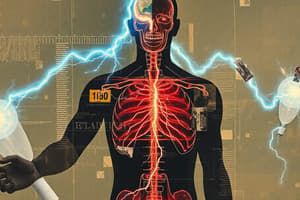Podcast
Questions and Answers
Electrical hazards are not a concern for rescuers responding to emergencies involving electrical systems.
Electrical hazards are not a concern for rescuers responding to emergencies involving electrical systems.
False (B)
High voltages and amperages are the only factors that make electrical injuries dangerous.
High voltages and amperages are the only factors that make electrical injuries dangerous.
False (B)
Partial insulation by dry clothing lessens the severity of electrical injuries.
Partial insulation by dry clothing lessens the severity of electrical injuries.
True (A)
Electrocution at heights cannot result in further injury to the casualty.
Electrocution at heights cannot result in further injury to the casualty.
Electricity is transmitted at a voltage between 50,000 volts and 100,000 volts.
Electricity is transmitted at a voltage between 50,000 volts and 100,000 volts.
The path electricity takes through the body is not critical.
The path electricity takes through the body is not critical.
A slight tingling sensation is expected when the current level passing through the body is 1 mA.
A slight tingling sensation is expected when the current level passing through the body is 1 mA.
Extreme pain, respiratory arrest, and severe muscular contractions can occur when the current level passing through the body is between 17mA and 99mA.
Extreme pain, respiratory arrest, and severe muscular contractions can occur when the current level passing through the body is between 17mA and 99mA.
High voltage can result in less internal damage, such as heart failure, but serious surface burns where the current enters and leaves the body.
High voltage can result in less internal damage, such as heart failure, but serious surface burns where the current enters and leaves the body.
Electricity is safe in normal operating conditions, and no hazards are created when electrical equipment becomes faulty due to wear or other deterioration.
Electricity is safe in normal operating conditions, and no hazards are created when electrical equipment becomes faulty due to wear or other deterioration.
An arc flash hazard can exist only when a person is using electrical equipment properly.
An arc flash hazard can exist only when a person is using electrical equipment properly.
If a fallen wire lies across a vehicle with occupants and the operator is injured and cannot move the vehicle, it is safe for emergency personnel to touch any part of the vehicle.
If a fallen wire lies across a vehicle with occupants and the operator is injured and cannot move the vehicle, it is safe for emergency personnel to touch any part of the vehicle.
All welders use electrical systems only to cut and braze, and do not face any electrical hazards during their work.
All welders use electrical systems only to cut and braze, and do not face any electrical hazards during their work.
Contact with overhead power lines is not a major cause of fatalities for crane operators.
Contact with overhead power lines is not a major cause of fatalities for crane operators.
Voltage is the force that causes the flow of electricity, and it is measured in watts (W).
Voltage is the force that causes the flow of electricity, and it is measured in watts (W).
Direct Current (DC) refers to a current flowing only from positive to negative.
Direct Current (DC) refers to a current flowing only from positive to negative.
Conductors are materials of high resistance that conduct electricity in such small quantities that it cannot normally be detected.
Conductors are materials of high resistance that conduct electricity in such small quantities that it cannot normally be detected.
Semiconductors have a value of resistance between those of insulators and conductors.
Semiconductors have a value of resistance between those of insulators and conductors.
Arcing is usually associated with a current interruption at a switch point, or loose terminal.
Arcing is usually associated with a current interruption at a switch point, or loose terminal.
Loose connections and overloaded electrical conductors or motors cause underheating.
Loose connections and overloaded electrical conductors or motors cause underheating.
Most electrically caused fires originate in equipment operating above 750 V.
Most electrically caused fires originate in equipment operating above 750 V.
The Canadian Electrical Code’s Safe Limits of Approach specifies a minimum distance of 4.5 M (15 ft) for voltage between 750–150,000 V.
The Canadian Electrical Code’s Safe Limits of Approach specifies a minimum distance of 4.5 M (15 ft) for voltage between 750–150,000 V.
Grounding rods are typically driven 1.5 m (5 ft) into the ground to ensure good contact with the ground.
Grounding rods are typically driven 1.5 m (5 ft) into the ground to ensure good contact with the ground.
A ground gradient creates two problems: step potential and touch potential.
A ground gradient creates two problems: step potential and touch potential.
Electricity can travel from a power line to a worker touching any part of the crane or the load.
Electricity can travel from a power line to a worker touching any part of the crane or the load.
Haul Trucks and Other Heavy Equipment Tires can explode during or after contact with power lines / lightning.
Haul Trucks and Other Heavy Equipment Tires can explode during or after contact with power lines / lightning.
If a vehicle contacts overhead power lines, there may be a massive electrical current flowing through the vehicle and its tires.
If a vehicle contacts overhead power lines, there may be a massive electrical current flowing through the vehicle and its tires.
Rescue teams must consider their approach angle, safe distances, and the size of the tire when responding to incidents involving vehicles in contact with power lines.
Rescue teams must consider their approach angle, safe distances, and the size of the tire when responding to incidents involving vehicles in contact with power lines.
Contact with power lines can cause tires to start burning inside vehicles.
Contact with power lines can cause tires to start burning inside vehicles.
A build-up of gases and heat inside a tire after contact with power lines could cause the tire to explode at a later time, even as much as 24 hours after the incident.
A build-up of gases and heat inside a tire after contact with power lines could cause the tire to explode at a later time, even as much as 24 hours after the incident.
Ground Engagement Tools such as excavators, dozers, and graders pose no hazard when in contact with buried power and communication lines.
Ground Engagement Tools such as excavators, dozers, and graders pose no hazard when in contact with buried power and communication lines.
It is safe for operators of equipment used during trenching and excavation activities to proceed without taking positive steps to eliminate the hazard posed by penetration of energized power lines.
It is safe for operators of equipment used during trenching and excavation activities to proceed without taking positive steps to eliminate the hazard posed by penetration of energized power lines.
It is essential for mine rescue teams to ensure that energy isolation is complete prior to conducting rescue operations in electrical emergencies.
It is essential for mine rescue teams to ensure that energy isolation is complete prior to conducting rescue operations in electrical emergencies.
When responding to electrical emergencies, it is safe for response vehicles to stage at any distance from the incident scene.
When responding to electrical emergencies, it is safe for response vehicles to stage at any distance from the incident scene.




